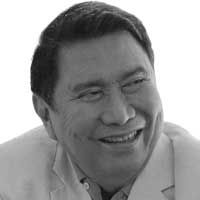Never coming back

“Filipinos are not trustworthy. I’m returning to Korea and never coming back.”
So said Haeng Jong Kim, a Korean investor, who was gypped by his Filipino partners, and fellow Koreans, who were apparently accomplices of the said partners.
Kim has invested a total of P100 million in the two years he has been in the country, most of it in the Aurora Pacific Economic Zone and Freeport (APECO).
The P100 million was gone with the wind in two years.
Kim, who came to the country as a junket operator for fellow Koreans who wanted to gamble in the country, was convinced in setting up a POGO (Philippine Offshore Gaming Operator) at the remote Freeport zone.
POGO is an online gambling firm that operates in the country but caters to customers outside the country.
To operate legally, POGO must secure a license from the Philippine Amusement and Gaming Corp. (PAGCOR).
But that’s not what happened in the case of Kim. His Filipino partners didn’t inform him about a Malacañang executive order that forbids APECO from issuing licenses for offshore gaming.
The Korean investor constructed two buildings in APECO for his gaming operations, not knowing that the Freeport in Aurora is a white elephant.
APECO, established in 2007, was a brainchild of the late Sen. Edgardo Angara and his son, Sonny, who was then a member of the House of Representatives.
APECO was originally set up to become an “ecology-friendly and tourism economic zone” in Casiguran town in Aurora province.
Its remote distance from Manila – about 355 kilometers by road travel – and its being prone to visitations by typhoons make APECO not viable as an economic zone.
Kim was not told about APECO’s shortcomings by his Filipino partners. He had two buildings constructed only to learn later that it was impossible to sustain offshore gaming operations in the area.
Nobody told Kim against setting up POGO booths in APECO as there was no electricity and internet connections in the area.
Early investors in APECO left one after the other since their sources of power were generators, and they had to pay P4 million each for an internet connection.
Kim’s Filipino partners asked P5 million from him, supposedly to pay off some officials at the Securities and Exchange Commission (SEC) to set up business in the country.
(What Filipino partners told Kim was most probably partly true as I was told about an SEC official demanding to have a share in every corporation that registers with the agency. In fact, this official now has built a mansion-like structure in his hometown when he only had a rundown house before his appointment to the SEC. – RTT)
It took time for his SEC papers to be approved and his Filipino partners told him he had to shell out P2.7 million more to expedite it.
Every step of the way, the Korean investor spent money.
One of his Filipino partners asked Kim for P5 million to teach him how to navigate the labyrinthine bureaucracy that is part of doing business in the country.
Kim, who is set to return to Seoul next month, said he is leaving with a “broken heart and broken dreams.”
We can’t blame Kim for his bad impression of the Philippines and Filipinos.
Many of us seem to hate fellow Asians and cheat them at every turn.
However, Caucasians, such as Americans, are spared from being cheated. It seems that we place the white race on a pedestal and prostrate ourselves before them. Talk about the Filipino’s Colonial Mentality.
As a host of the public service program “Isumbong mo kay Tulfo,” I’ve been witness to many cases where Filipino partners cheated their Asian investors. The duped Asian investors complained to me.
When I was special envoy to China, some big-time investors from the Mainland told me they had to pay millions of pesos to some officials at the Cagayan Economic Zone Authority (CEZA) in order to do business in the freeport area.
Based on the complaints, I exposed the corruption at CEZA in my column in another paper; but the exposé came to nothing as an investigation was never made.
Look at what happened to the deal about the public bidding for the sale of the Manila Hotel, which was won by a Malaysian in 1997.
A losing Filipino bidder went to the Supreme Court which awarded the deal to him, citing “national patrimony.”
During the administration of Gloria Macapagal-Arroyo, the Okada hotel and gaming complex was constructed.
Kazuo Okada bought 30 hectares of the 100-hectare land area reserved for the Entertainment City in Pasay City.
Okada paid just over $300 million for the still undeveloped real estate which was reclaimed from the Manila Bay.
The Japanese billionaire’s company, Universal Entertainment Corporation, also reportedly transferred $40 million to Rodolfo “Boysie” Soriano, then a PAGCOR consultant, to help facilitate building his hotel, according to a Reuters special report released in 2012.
Reuters, in another report, said that then first gentleman Mike Arroyo was closely connected to Boysie Soriano.
Needless to say, nothing happened to the Reuters exposé.
* * *
The government has been inviting foreign investors to do business in the country, as we sorely need dollars for our foreign reserve.
The government promises a smooth flow in terms of processing the approval of their permits and licenses and – take note of this – that there will be protection from scoundrels.
But the crooks that the government promises to protect them from are the very same officials that deal with foreign investors.
* * *
Joke! Joke! Joke!
A six-year-old boy is praying before going to sleep: Dear God, please send clothes to all the poor ladies on my grandfather’s computer. Amen.
- Latest
- Trending




























